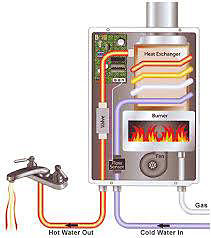Are Tankless Water Heaters Worth The Investment?
Posted on: December 12, 2016
By: Alan O'Neill
Posted in: Press Releases
What are the Pros and Cons of Tankless Water Heaters?
One of the worst starts to your day is trying to get ready for work and getting a cold shower because someone else used all the hot water. It takes a good amount of time for the tank to fill back up, turn on the burner, and heat the water. By then, you’ve already left for the day.

Tankless water heaters save money in the long run, but initial costs are higher than tank models.
Endless hot water, additional storage space and lower energy bills are just a few reasons homeowners are switching to tankless water heaters.
But those perks may not be enough for some people to offset the extra purchase cost and installation expense.
The U.S. Department of Energy estimates gas-fired tankless heaters save an average of $108 in energy costs per year over their traditional tank counterparts, while electric tankless heaters save $44 per year.
Sound good? Don’t start spending that savings just yet.
Tankless water heaters cost up to three times more than storage heaters — from less than $1,000 for an electric, whole-house model to $3,000 for a gas-powered one, including installation by a qualified plumber.
Also, not all homes are ready to support tankless water heaters. For homeowners with electric-only utilities, their electrical system may needed to be upgraded, which means hiring an electrician
Rewiring your house can easily add as much as $5,000 to the cost of installing a tankless water heater.
Tankless models save space, offer longer warranties
Many homeowners, however, see benefits of a tankless water heater beyond energy savings.
These heaters also save space with a compact design, last longer and are better for the environment because a rusty tank doesn’t end up in the landfill.
“A lot of people buy them because of the green movement,” says Connie Steele, co-owner of Gulf Coast Tankless Hot Water in Clearwater, Florida.
Tankless water heaters also typically have a longer warranty.
Larry Murdock, a water heater specialist with Caffi Contracting Service in Alexandria, Virginia, says the warranty is usually 15 years for a tankless. Traditional water heaters come with up to a six-year warranty.
“With a tankless, you also won’t have the breakdown issue with water on the floor,” he says.
Is a tankless water heater right for you?
Here are some things to consider before making the decision to go tankless:
- Demand: Do you want a unit to heat water in one bathroom or the entire house?
- Type: Consider the requirements. An electric model will need the proper voltage, amperage and circuit breaker. Gas-fired models need to be vented.
- Location: They must be within roughly 50 feet from a power source, and can be mounted on an interior or exterior wall.
- Life expectancy: Most last more than 20 years — about twice the lifespan of storage water heaters.
- Installation: Hire a highly rated plumber or heating and A/C contractor to install it. Often, the installation is included when you purchase a unit from a dealer.
Tankless water heaters: electric or gas?
So you’ve decided to go tankless. Now what?
First, you’re going to need to choose either an electric or natural gas model.
Major differences exist between them even beyond the potential cost of rewiring your house as mentioned earlier.
Electric tankless heaters are 99 percent efficient. However, they don’t qualify for rebates or an Energy Star rating, which requires a product improve energy output 14 percent over older models.
The worst traditional electric heaters are 93 percent efficient.
Tankless water heaters that use natural gas are about 23 percent more efficient than a traditional storage version, which is about 60 percent efficient, according to the Department of Energy.
Most gas-powered tankless water heaters do qualify for a $300 federal tax rebate. Many states offer similar incentives.
Steele started her tankless water heater business in Florida after watching her own electricity bills decline thanks to the switch.
Abacus Plumbing, Air Conditioning & Electrical is a full service residential contractor that has been serving the greater Houston area for over 50 years. Abacus is a member of the Greater Houston Chamber of Commerce and has an A+ rating on the Better Business Bureau of Houston. Abacus is licensed and insured and offers 24/7 emergency service. To learn more about Abacus Air Conditioning, Plumbing & Electrical, visit www.abacusplumbing.net or call 713-766-3605. License Numbers: ALAN O'NEILL M-20628 | TACLB82488E | TECL 30557
Abacus Plumbing, Air Conditioning & Electrical services the greater DFW area including, but not limited to: Houston, Humble, Baytown, Bellaire, Conroe, Katy, Spring, Sugar Land, The Woodlands and more. Check out Abacus Plumbing, Air Conditioning & Electrical reviews or see Abacus A+ BBB to confirm Abacus is a company you can trust.